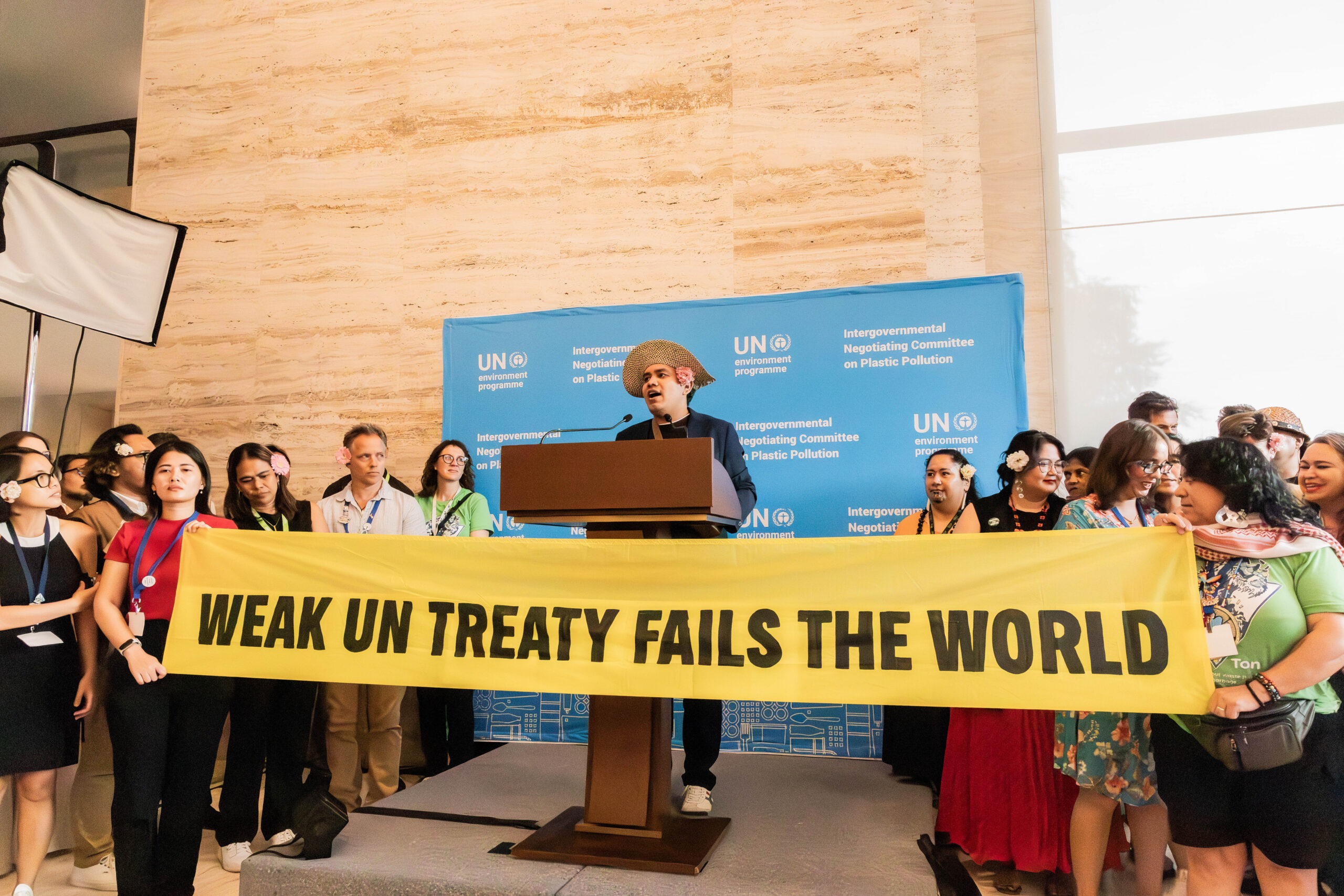Diplomats in Geneva are racing to clinch a last-minute agreement on a global plastics pact and rescue fraught talks from collapsing without a deal.
As negotiations neared the end of their final day at the UN headquarters in the Swiss city, government delegates were still waiting for the latest version of a draft treaty text being prepared by the chair of the talks after nearly all countries rejected a previous proposal tabled on Wednesday.
That text – which wholly excluded measures aimed at reducing plastic production – was variously described as “repulsive”, “entirely unacceptable” and “wholly inadequate” by country representatives in heated exchanges during a three hour-long plenary session on Wednesday.
Dozens of diplomats from the self-styled “high-ambition coalition” of around 75 countries and the European Union argued that the chair’s proposal failed to tackle the full lifecycle of plastics – including polymers primarily derived from fossil fuels – and was based on voluntary, rather than binding, measures.
Show courage to vote for a strong plastics treaty, campaigners urge countries
Campaign group Greenpeace described the text as a “gift to the petrochemical industry and a betrayal of humanity”.
But even many fossil fuel-producing countries, including Saudi Arabia and Kuwait – speaking on behalf of the self-styled “Like-Minded” group – voiced disappointment with the proposal on Wednesday. They complained that it failed the define the scope of the treaty, which they want to be clearly narrowed to downstream measures like waste management.
Weak deal would ‘fail the world’
Frantic consultations and bilateral meetings followed in the last 24 hours of the ten-day talks in a bid to break a long-standing deadlock and find a difficult compromise that could bring all countries on board after two and a half years of discussions.
In a message sent to country delegates on Thursday afternoon, Valdivieso said he trusted that “the revised proposal will bring us to the delivery of our collective mission”.
“I count on your resolute support and spirit of flexibility as we reach the summit together,” he added.

As a final plenary meeting kept getting delayed on Thursday evening, Juan Carlos Monterrey-Gomez, Panama’s special representative for climate change, hopped on a podium flanked by campaigners and spoke out behind a banner with the message “weak UN treaty fails the world”.
He urged delegates to “work harder” in the remaining hours as “this might be our last chance to get a global framework”.
Monterrey-Gomez reiterated that the treaty needs to tackle “unhinged plastic production” and send the same kind of signals as the Paris Agreement on climate change which “unlocked innovation” in renewables and electric mobility.
COP30 host Brazil drops support for plastic products ban in new global pact
Earlier in the day, French President Emmanuel Macron also called on countries to “adopt a text that is on par with the environmental and health emergency” caused by the plastics crisis. “What are we waiting for to act?” he asked in a message posted on LinkedIn.
Before restarting talks in Geneva nine days ago, countries had already failed to clinch an agreement at what was meant to be the final round of negotiations in Busan, South Korea, in December last year.
Since then, positions have remained broadly entrenched with the exception of the United States which has more closely aligned itself with fellow oil and gas-producing nations that are pushing for a light-touch treaty without any provisions to curb plastic production.
Rising tide of plastic
Plastic production is set to almost triple by 2060 without intervention, according to the Organisation for Economic Co-operation and Development.
Only 9% of plastic is recycled globally, with the majority ending up in landfills or leaking into oceans and rivers. As nearly all plastic is made from planet-heating oil, gas and coal, the sector’s trajectory will have a significant impact on global efforts to reduce greenhouse gas emissions and meet the Paris Agreement climate goals.
Speaking to journalists on Thursday morning, Sivendra Michael, Fiji’s lead negotiator, said he refused to leave Geneva empty-handed after travelling for three days to reach the negotiations.
“I have complete faith and hope they are pushing beyond limit to try and find a compromise,” he added. “It is high time we make difficult decisions and deliver on a fair and balanced treaty for all.”
On Thursday evening, as the clock ticked down, it was unclear whether he would be returning home with the hoped-for deal or whether his arduous journey would have been in vain.

